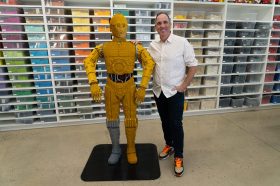Image: shutterstock.com
Career paths don’t always go to plan and sometimes we find ourselves in a role that isn’t quite what we imagined. Planning for your future career can mean a big change or maybe just a slight adjustment, but how do we know what decision is right? ArtsHub spoke to students from Open Universities Australia to find out.
What’s your purpose?
Nathan Leigh Jones works as a voiceover artist and musician and decided to study psychology to learn more about human behaviour and communication.
‘The best steps I’ve taken in planning my future career have all involved setting aside time for some deep personal exploration. Our internal selves can often be a messy and scary place. I know mine was! The thing is, until we really spend a lot of time asking ourselves the tough questions, it’s hard to find a career that aligns with the core of who we are,’ he explained.
Jones’ decision to study online through Open Universities Australia (OUA) allowed him to complete a Bachelor of Behavioural Studies (Psychology) with Swinburne University that will help him find a fulfilling career.
‘For me, the tough questions started with asking myself what I want my legacy to be. When I die, what do I want to be remembered for bringing to the world? At the end of my life, what would I regret never having tried? With my remaining days on earth, how can I best serve others? Some of these questions can seem a little dark and depressing, but I’ve found them really effective in bringing a clearer picture into my mind of what a future career might look like. Once you’ve targeted your life purpose, you can work backwards from there.’
Read: Can studying psychology help your creative career?
Think a couple of steps ahead
Once you have explored your personal drivers you’re in an exciting position where you can decide what to do next. For Nykkea Volkers, she realised her future career development and aspirations to work in marketing relied on further education and enrolled in a Bachelor of Business with Swinburne University via Open Universities Australia. ‘I knew that to compete in the field I wanted to work in I had to have that university requirement,’ she said.
Her advice is to always look a couple of steps ahead. ‘It’s important to consider what’s going to happen in the future in the field that you’re in. Continuous learning is very instrumental in preparing you for that.’
Thinking ahead also led Volkers to apply for positions in the field she wanted to work in while she completed her studies part time. The flexibility of studying online through OUA —where she was able to complete units at various universities that she chose, and still graduate with the exact same degree as an on-campus student — helped her to make connections between her work and study so she could put theory in practice. ‘I’ve been able to leverage my degree in my work, but also do the same for my degree. The work I do day to day has helped with that.’
Allow for flexibility
Tristan McLindon recently started his own production company that specialises in corporate videos and online content after completing a Bachelor of Communication at Griffith University through OUA. His advice for those planning for a future career in the industry is to allow space for the unexpected.
‘In the film and acting industry it can be very unpredictable, so in that way it’s pretty hard to plan each step. I have tried to have long term goals to achieve and reach in terms of my own writing and production but it’s a funny thing, especially in acting where work wise you can have very little on then you get a phone call which not only gives you work but also could be a massive building block on your career that you couldn’t have thought of or planned.’
‘I’ve found planning for the future in my field is more about being involved in what projects you can and making sure you always give it your best and network with those around you.’
‘Like any industry really and anything that you want to succeed in, it takes patience. There’s a lot of times where decisions or plans you make to further your career really end up nowhere. So it’s important not to be too stuck to your plans and be ready for a curve ball that could ultimately end up helping you progress.’
To find out more about OUA visit open.edu.au





